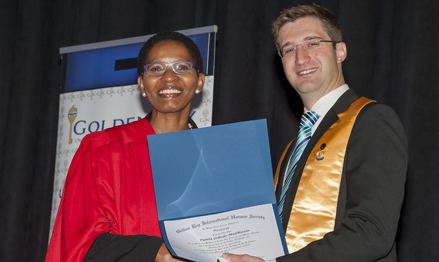Latest News Archive
Please select Category, Year, and then Month to display items
12 October 2020
|
Story Arina Engelbrecht
|
Photo Supplied
 Arina Engelbrecht from Organisational Development and Employee Well-being believes physical activity has a number of benefits for one’s health, including stress relief.
Arina Engelbrecht from Organisational Development and Employee Well-being believes physical activity has a number of benefits for one’s health, including stress relief.
Being physically active plays a big role in preventing the development of mental-health problems and in improving the quality of life of people experiencing mental-health problems.
Treatment for depression
Physical activity can be an alternative treatment for depression. It can be used as a stand-alone treatment or in combination with medication and/or psychological therapy. It promotes all kinds of changes in the brain, including neural growth, reduced inflammation, and new activity patterns are formed that promote feelings of calm and well-being. It releases endorphins – powerful chemicals in the brain that energise your spirit and make you feel good.
Physical activity can be very effective in relieving stress. Research in adults has found that physically active individuals tend to have lower stress levels compared to individuals who are less active. It also leads to improved sleep. When a person sleeps better and feels more rested, overall quality of life improves. They cope better with daily life stressors.
Reduce Alzheimer's risk
Regular physical activity can reduce your risk of developing Alzheimer's disease by up to 50%. It can also slow down further deterioration in those who have already started to develop cognitive problems. It stimulates the brain’s ability to maintain old connections as well as to make new ones.
A study asked people to rate their mood immediately after periods of physical activity (e.g. going for a walk/run, cycling, doing housework) and periods of inactivity (e.g. reading a book or watching television). Researchers found that participants felt more content, more awake, and calmer after being physically active compared to after periods of inactivity.
In conclusion, people who are physically active feel a sense of well-being, feel more energetic throughout the day, sleep better at night, have sharper memories, and feel more relaxed and positive about themselves and their lives.
“Being physically active not only changes your body, it changes your mind,
attitude, and your mood.” – Arina Engelbrecht
Golden Key International Honour Society swells it ranks with Kovsie students
2013-08-28
|
 |
|
Golden Key honorary member, Prof Pumla Gobodo-Madikizela, with Stefan Gericke, Chapter Relations Officer of Golden Key International Honour Society.
Photo: Sonia Small
28 August 2013 |
Kovsie students continue to swell the ranks of the world’s biggest academic honour society, the Golden Key International Honour Society, with more than 500 students from the university becoming new members.
The UFS chapter of the society – who only welcomes the top 15% of academic students at the university – inducted the new members at a ceremony held on Saturday 24 August 2013 on the Bloemfontein Campus.
In addition, the organisation also pays recognition to those who act as role models to these students. Thus, the organisation also inducted Profs Odireleng Ntwaeaborwa, Dave Lubbe, Dennis Francis, Pumla Gobodo-Madikizela and executive chairperson of Richmark, Gavin Varejes as honorary members.
Prof Dave Lubbe delivered the keynote speech entitled “From intellectual leader to real leader – few ideas”, structuring his talk around five key points: wisdom, basics, over specialization, ethnical leadership and courage.
“The society aims to make students realise their potential and create a network for excelling students,” said Mbavhalelo Rammbwa; Golden Key UFS Chapter president.
Parents from as far as Limpopo came to show appreciation for their children’s dedication to their studies. “I am really happy not only for my daughter, but for every single student who has been inaugurated to the society this morning for their discipline, hard work and the dedication they show their studies. I thank Prof Jonathan Jansen, the lectures and academics for inspiring our children to study and make the most of the opportunity which we didn’t have,” said Mpho Mohoje, a parent of one of the students at the induction.
Another feather in the university's cap is the fact that UFS registrar, Dr Derek Swemmer is not only co-advisor of the chapter, but also the chairperson of the society’s international governing body.